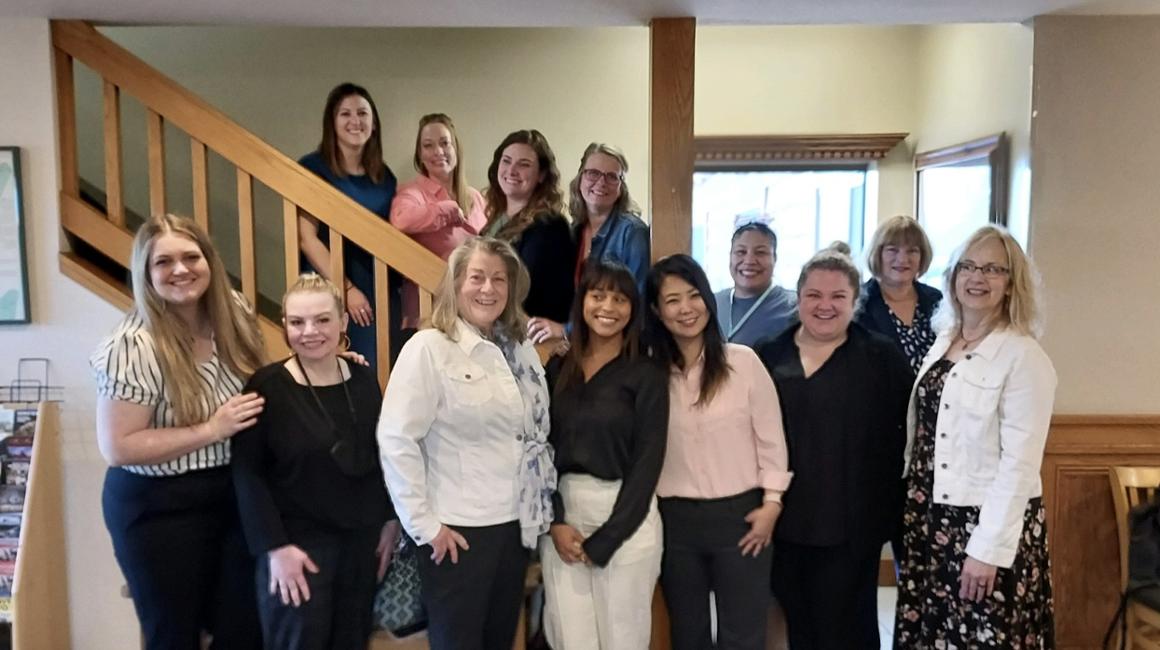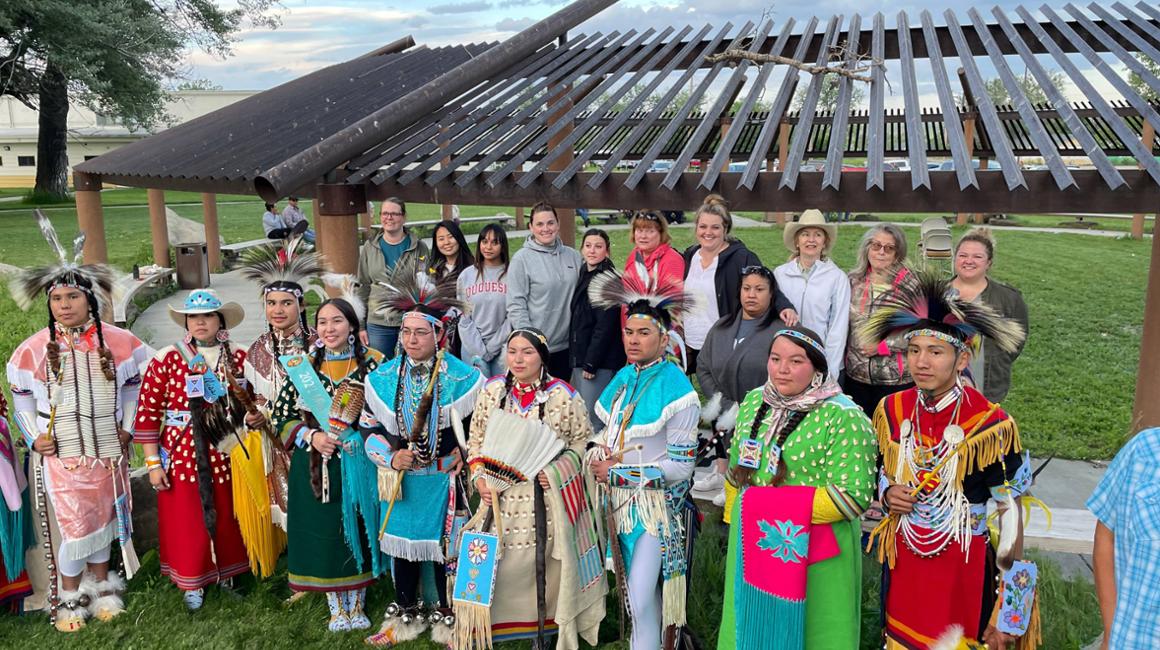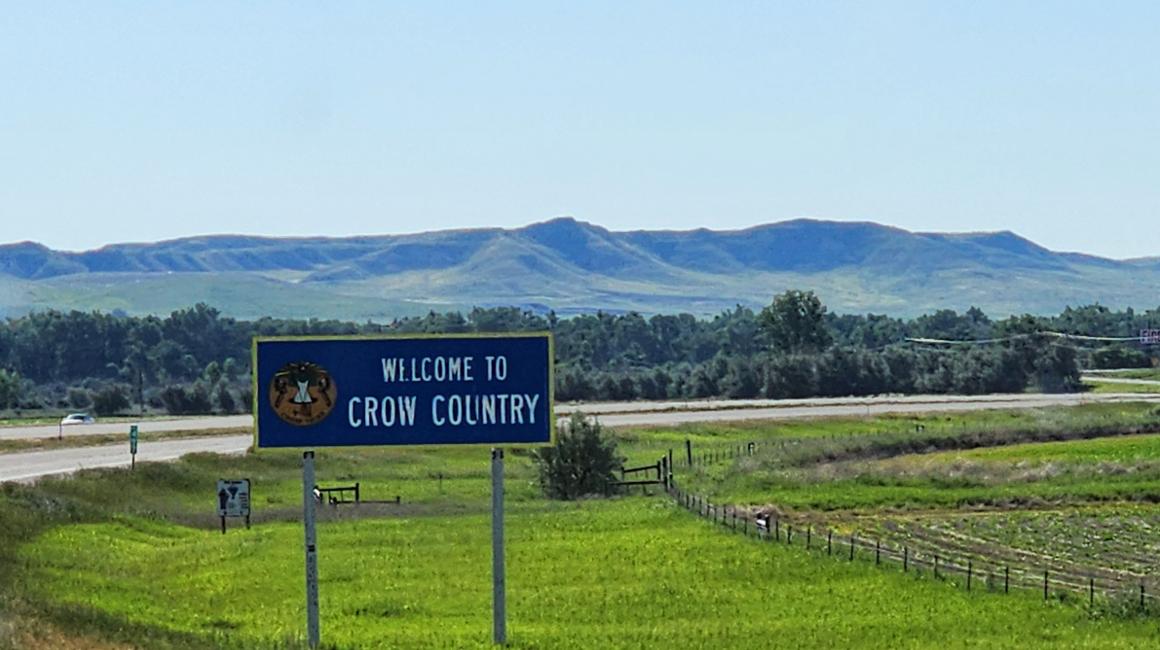Duquesne Graduate Nursing students immerse themselves in Native American culture to connect clinical practice with cultural understanding.
As a nurse, mastering the intricacies of the human body is vital, but understanding the broader context of cultural influence on health and how an individual’s well-being is intertwined with community health is equally important. Many, including a large number of Duquesne University School of Nursing students, seek to develop this perspective through unique learning experiences. Few, however, get the chance to study abroad within their own country.
One such opportunity is the Crow Nation Clinical and Cultural Immersion, offered exclusively to Duquesne Master of Science in Nursing (MSN) students. This immersive program allows students to engage deeply with the Crow Nation, located just outside of Billings, Mont., through clinical experiences with the Indian Health Service or a cultural population health analysis.

For the past three summers, a group of students led by Clinical Associate Professor Ruth Irwin, PhD, RN, CSN, along with Director of Graduate Clinical Faculty and Clinical Affairs and Assistant Clinical Professor Donna White, DNP, CRNP, FNP-BC, had this unique opportunity. They spent two weeks on the Crow Nation reservation, immersing themselves in a way of life that, while native to the nation, felt foreign to many. Roughly half the students aimed to gain clinical experience, while the other half focused on population health initiatives. All returned with transformed perspectives, a deeper appreciation of indigenous culture, and insights into the historical and systemic challenges faced by many on reservations.
Evaluating the Elements
For Irwin’s group, the trip was a whirlwind of cultural experiences. Students engaged with a variety of local leaders, including one Montana state representative, and the Crow Tribal Government Speaker of the House, who is elected by Crow Tribal members only, along with the public health director of the Indian Health Service, forestry and wildlife experts, professors, anthropologists, and many members of the tribe, including group liaison Latonna Old Elk.

These local experts helped paint a picture of life on the reservation, touching on everything from proud Crow traditions to modern-day challenges facing the tribe: wildfires and floods, substance abuse, food insecurity, sexually transmitted disease, historical trauma, and generational poverty, to name a few.
Students also visited numerous sites across the 2.3 million-acre reservation. These excursions were not just meant to display the majesty of the region but to highlight to students the region’s natural beauty underscoring the public health challenges caused by vast distances, limited infrastructure, and scarce resources.
“As a nurse, when we talk to our patients, we want to ensure they understand how to take care of themselves,” says Kimberly Keane, an MSN student in the Forensics program in Irwin’s group. “You want them to eat the right foods and take care of themselves—but how do you encourage healthy eating when there is no grocery store close by? How do you reach the store without a working car, because yours broke down and there are no auto parts stores? And how do you protect yourself from issues like sex trafficking or sexual assault when the systems meant to hold people accountable are ineffective? Who has jurisdiction in these matters? What are the rules there, and how do they affect people’s lives? These questions really challenge you.”
Irwin emphasized that raising such questions is central to the students’ learning experience. “The goal is to push students out of their comfort zone and into new environments, thus giving them the perspective of a new population,” Irwin explains. “At Duquesne, our mission is to help our students learn and become knowledgeable about global issues, and the best way to achieve that is through global emergence.”
Taking a Closer Look
Students in White’s group adopted a more traditional nursing approach, spending time at the reservation’s small hospital and nearby clinics assisting with clinical evaluations and care. Even in this familiar setting, there were still plenty of valuable lessons to be learned. “Coming from Pittsburgh, where we have extensive access to specialists, you realize this community is missing those same benefits,” says Katie Bruce, an Adult-Gerontology Acute Care Nurse Practitioner student, who participated in the program in 2022 with Irwin and then again in 2023 with White. “You realize, when someone comes into the ER, you might be the only provider they see. You have to do more than just triage; you must go the extra mile.”
White hoped this paradigm shift would awaken her students to realities present in America. “It opens their eyes to the challenges that exist in this country,” she says. “If you go somewhere else, you might expect that. Students must be creative in how they approach these patients and develop treatment plans based on what is available to the hospital and the patient.”
Celebrating Cultural Differences
Both professors stressed the importance of not imposing solutions on the community in which they visited. Rather, they aimed for students to observe and identify issues, engage with the people about their concerns, and empower individuals and communities to set their own health priorities. This approach is foundational to cultural competency in nursing.
“It is a completely different way of thinking about the true needs of people,” Keane reflects. “Looking at the social determinants of health and thinking, ‘Wow, they have so many areas that need assistance, where do you even start to help make that better?’ But you don’t want to tell them what to fix; you realize the importance of empowering them to create change.”
The impact of the trip was profound; some students made plans to return. Bruce joined White’s group on a second trip after her initial experience, while Keane adjusted her course load in order to return again the following year.
Amid tackling serious challenges, students also enjoyed celebrating the beauty of the area and the Crow people. The last trip was scheduled to coincide with Crow Native Days Grand Powwow that invites surrounding communities to engage with Crow traditions, food, and ceremonies. For students, this event represented the culmination of their experiences and a chance to connect more intimately with the community they served. For the community, the presence and involvement of Duquesne nursing students provided a platform to showcase their rich, centuries-old ceremonial dances and customs, which are deeply cherished and respected.
“As a future health care provider, it is essential to recognize that every culture has its traditional practices,” Bruce says. “Understanding a patient’s cultural background—from an educational, religious, or cultural standpoint—can enhance their mental and emotional well-being as much as medical treatment does for their physical health. Attending the powwow, seeing the beautiful outfits, dances, and ceremonies, deepened my understanding of why these traditions matter.”
The Crow Nation Clinical and Cultural Immersion experience aligns with Duquesne University’s mission to foster cultural competency in its students. By emphasizing the importance of understanding and respecting diverse backgrounds, Duquesne prepares its nursing students to provide compassionate care to all communities.
Through experiences like these, students learn that nursing goes beyond clinical skills—it encompasses caring for individuals, families, and communities while recognizing the environment’s influence on health. It also requires empathy, cultural awareness, and a commitment to serving those who may be overlooked. As the students carry these lessons forward, they embody the University’s dedication to nurturing a more equitable and inclusive health care landscape for all.
News Information


